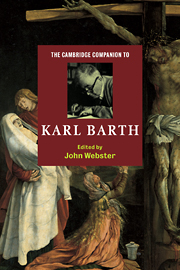Book contents
- Frontmatter
- 1 Introducing Barth
- 2 Theology
- 3 Revelation
- 4 The Bible
- 5 The Trinity
- 6 Grace and being
- 7 Creation and providence
- 8 Karl Barth’s Christology
- 9 Salvation
- 10 The humanity of the human person in Karl Barth’s anthropology
- 11 The mediator of communion
- 12 Christian community, baptism, and Lord’s Supper
- 13 Barth’s trinitarian ethic
- 14 Karl Barth and politics
- 15 Religion and the religions
- 16 Barth and feminism
- 17 Barth, modernity, and postmodernity
- 18 Karl Barth
- Index
2 - Theology
Published online by Cambridge University Press: 28 May 2006
- Frontmatter
- 1 Introducing Barth
- 2 Theology
- 3 Revelation
- 4 The Bible
- 5 The Trinity
- 6 Grace and being
- 7 Creation and providence
- 8 Karl Barth’s Christology
- 9 Salvation
- 10 The humanity of the human person in Karl Barth’s anthropology
- 11 The mediator of communion
- 12 Christian community, baptism, and Lord’s Supper
- 13 Barth’s trinitarian ethic
- 14 Karl Barth and politics
- 15 Religion and the religions
- 16 Barth and feminism
- 17 Barth, modernity, and postmodernity
- 18 Karl Barth
- Index
Summary
However highly one values Barth's material contributions to theology, one could argue that his main significance lies not so much in what he contributed to the 'scientific self-examination of the Christian Church with respect to the content of its distinctive Talk about God' (CD I/I, p. 3), but in the way in which he taught his readers to conceive the task of theology and its presuppositions and procedures. One could even claim that the presentation of Barth's theology and its continual revision is a consequence of the new conception of the task of theology which shapes his theological 'forms of thought'. What makes Barth's material contributions to theology so significant is that they are part of a new way of understanding the task of theology which can be most clearly seen by contrasting it to what was taken for granted in the 'forms of thought' of modernity and its theology. Today those 'forms of thought' are no longer taken for granted, neither in theology nor outside theology. This provides a new stimulus for engagement with Barth's understanding of theology, its development, its elaboration, its problems and its promises in a situation which is no longer self-consciously modern, but is characterized by an uneasy oscillation between seeing itself as postmodern and/or late modern.
- Type
- Chapter
- Information
- The Cambridge Companion to Karl Barth , pp. 17 - 36Publisher: Cambridge University PressPrint publication year: 2000
- 3
- Cited by

